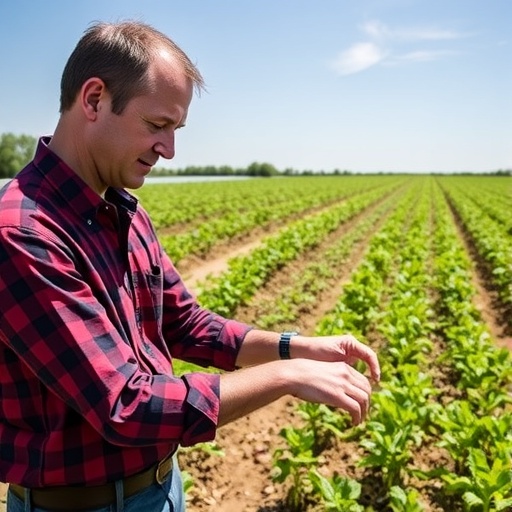A revolutionary advancement in plant biotechnology has emerged from Texas Tech University, thanks to the pioneering efforts of a team led by Gunvant Patil. This groundbreaking method promises to redefine plant regeneration and gene editing, significantly accelerating the development of crop varieties that are essential in addressing global food security challenges. By streamlining one of the most labor-intensive and complex processes in genetic engineering—tissue culture—this innovative approach could herald a new era in agricultural biotechnology.
Traditionally, the regeneration of plants through genetic engineering has been fraught with difficulties. Regenerating a whole plant from a single cell is no small feat; it demands precise nutrient formulations and specific hormone combinations over an extended period. This often-results in a slow, costly process that depends heavily on the genotype of the plant in question. The researchers at Texas Tech University have identified a more efficient way to exploit the plant’s innate wound-healing capabilities, circumventing the complications associated with tissue culture. This breakthrough could potentially transform crop development and genetic modification as we know it.
Patil’s team, comprising graduate student Arjun Ojha Kshetry, among others, has developed a synthetic regeneration system that enables the direct growth of new shoots from damaged plant tissue. By utilizing the plant’s natural regenerative mechanisms, the scientists bypass the conventional tissue culture steps that typically consume months. The implications of such a method are profound, particularly in creating genetically modified crops that are resilient, nutrient-efficient, and better equipped to withstand diseases.
The researchers utilized two critical genes in their synthetic system: WIND1, which encourages cells near a wound to reprogram, and the isopentenyl transferase (IPT) gene, which is instrumental in producing natural hormones that stimulate shoot growth. These genes work synergistically to initiate a self-contained cascade of regeneration, allowing for the production of gene-edited shoots in a range of crop species, including tobacco, tomatoes, and soybeans. This innovative approach effectively unlocks a hidden switch within the plant that activates its self-repair mechanisms, leading to faster regeneration times.
The technique also integrates seamlessly with CRISPR-based genome editing tools, which are renowned for their precision in making gene modifications. This capacity to produce transgenic plants directly on the parent organism eliminates much of the lag time traditionally associated with genetically engineering crops. The potential benefits extend beyond efficiency; they include making advanced agricultural biotechnology accessible to a broader array of research programs and crop types around the globe.
Patil’s collaborator, Luis Herrera-Estrella, emphasized that this advancement marks a significant step toward democratizing access to plant biotechnology. By lessening reliance on specialized lab facilities and complex tissue culture methods, this new system opens the doors for many more species to be modified genetically. Furthermore, it promisingly points to an increased capacity for global agricultural innovation, which is urgently needed as the world grapples with pressing food security challenges.
The results from the study highlight remarkable success rates in shoot regeneration for tobacco and tomatoes, demonstrating a clear advantage over existing tissue culture-free transformation techniques. Even for notoriously challenging species like soybeans, which have historically evaded efficient genetic modification methods, this new approach has shown promising results with minimal reliance on conventional culture systems.
This research signifies a monumental leap forward for agricultural science, and it aligns with Texas Tech’s commitment to addressing some of the most pressing issues in global food security and sustainable agricultural practices. Clint Krehbiel, the dean of the Davis College of Agricultural Sciences & Natural Resources at Texas Tech, remarked on how this breakthrough could reshape agricultural research and contribute to sustainable production practices globally.
As the team prepares to adapt this innovative technique for other essential food and energy crops, including cereals and legumes, the potential to integrate this methodology with advanced genome editing technologies is exhilarating. Such advancements could accelerate the breeding processes needed for global food security, ultimately leading to improved resilience, disease resistance, and nutrient efficiency in crops across diverse ecosystems.
Gunvant Patil envisions a future where a universal platform for plant transformation dramatically cuts the time from discovery to the development of improved crop varieties. Their goal is to slash the traditional timeframe in half or more, revolutionizing the genetic engineering landscape and fostering a new wave of agricultural advancements.
The researchers understand that the challenges posed by environmental changes, disease outbreaks, and nutrient depletion are increasingly pressing. By harnessing the plant’s natural abilities and improving genetic engineering efficiency, they aim to develop crops that can better withstand these challenges and provide secure, reliable food sources worldwide.
Postdoctoral researchers Kaushik Ghose and Vikas Devkar contributed their expertise to this groundbreaking study, further highlighting the collaborative spirit that flourishes in Patil’s lab at Texas Tech University. Through their collective efforts, they are poised to influence not only research but also the practical applications of biotechnology in the quest for sustainable agricultural solutions.
In conclusion, the strides made by this research team at Texas Tech University represent a significant turning point in the field of plant biotechnology. As they continue to refine their methodologies and expand their focus to include a wider range of crop species, their work holds the promise of delivering enhanced agricultural productivity and sustainability for future generations. These developments are crucial as we confront an era characterized by heightened challenges to global food security.
Subject of Research: Lab-produced tissue samples
Article Title: A synthetic transcription cascade enables direct in planta shoot regeneration for transgenesis and gene editing in multiple plants
News Publication Date: 6-Nov-2025
Web References: Molecular Plant
References: DOI: 10.1016/j.molp.2025.09.017
Image Credits: Texas Tech University
Keywords
Genetic engineering, Bioengineering, Molecular genetics, Genome engineering, Genetic technology, Transgenic plants.




